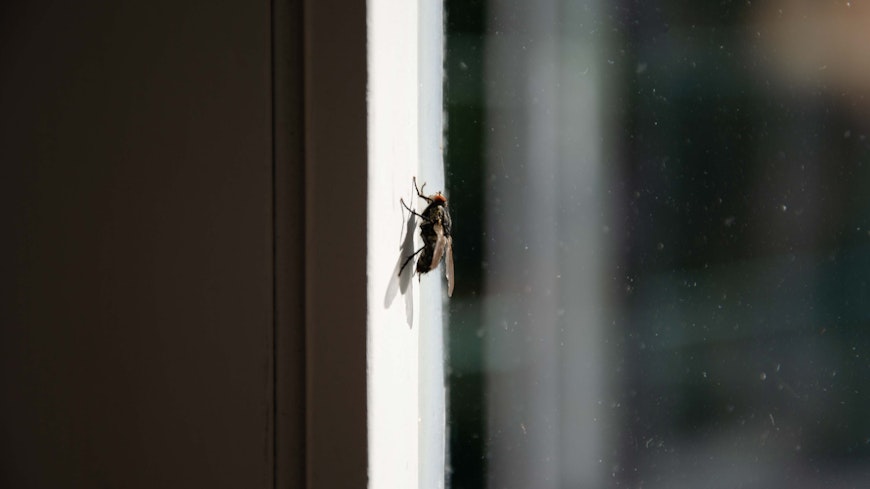
By Imogen Wara
Former Community Journalist | Kaihaurapa Kōrero Hapori
Like most insects, flies flourish in summer. That’s also the time you notice them coming into your home, and you might be tempted to grab the fly spray. But that might not be the best option.
New Zealand is home to 3000 native fly species in addition to several introduced species. Most are harmless and many are beneficial, acting as important pollinators.

The types of flies you get in your home depend on where you live (for example, near the beach or near the bush), and whether you have a flowering backyard.
The flies that cause us the most irritation are house flies, lesser house flies and blow flies. All of these fly species can spread disease as the bristles on their legs pick up germs and distribute them wherever they land. However, an infestation of scuttle flies or vinegar flies (commonly called fruit flies in New Zealand) is simply a nuisance.
In summer, your home might also be visited by horse flies, hover flies, soldier flies and all sorts of gnats and midges, which are harmless.
Te Papa entomologist Julia Kasper, who specialises in the order Diptera (flies), advises against using chemical sprays to deal with them.
“There are many beneficial insects,” she told Consumer NZ. “The spray doesn’t know which one is harmful and which is not. It is also not very good for you. We need to target the harmful flies, and not kill the good ones. So it’s best to prevent them coming in.”
If you have a serious infestation of pest insects such as fleas, she said you might need to use chemicals to deal with them, for example by using a flea bomb. The best option might be to call in a professional exterminator, but this can be costly.
Here are 4 ways to keep flies out this summer
1. Keep food covered and wipe down surfaces where food is stored, used or eaten – daily.
Since flies are drawn to meat, fruit and vegetables, it pays to clean up all food but especially meat, fruit and veg. Don’t leave dirty dishes around, keep the fruit bowl in the cupboard and keep the sink area clean as well.
2. Ensure your rubbish is sealed and your bin is clean.
Flies are attracted to decay and fermentation. This makes rubbish bins an alluring place for them and often is where the females lay their eggs. By keeping the area as clean as possible, you’ll minimise these risks. It may help to keep a food waste bin which you can empty more regularly.
3. Plant herbs and flowers that repel flies, in and around your home.
These natural approaches are popular due to concerns about the impact pesticides in sprays can have on other insects and on humans. Some fly species have developed resistance to certain insecticides, too.
Basil, peppermint, marigold, lavender, bay leaves and catnip are known to repel insects, including flies.
Kasper said if you are thinking Venus flytraps, think again. You would need a lot of them to even make a slight difference, and they’re not cheap!
4. Set traps to repel or kill flies.
You can make homemade traps and repellents using everyday household items.
Mix apple cider vinegar and dishwashing liquid in a tall glass, cover with plastic wrap and poke holes in the top. This will attract flies, trapping and drowning them. Vinegar mixed with sugar can also lure them into a homemade trap.
Another option is to mix cayenne pepper with water in a bottle and spray it around your home to repel them.
And those sticky strips of fly paper also do a good job. The paper has a natural adhesive which attracts the flies, which then get stuck. The only downside is the sight of a load of dead and dying flies.
It also doesn’t hurt to use a blue light to draw flies away from your home. Hang a blue light in a far corner of your yard, maybe one especially made to zap bugs that get too close.
What doesn't work?
Kasper said citronella candles and coils don’t really work for flies. They are meant for mosquitoes (also a type of fly) but are just not strong enough to be really effective.

Subscribe to our newsletters
Get even more Consumer NZ news and invitations to share your voice on important issues straight to your inbox. You don’t have to be a member to have these newsletters emailed to you regularly.


